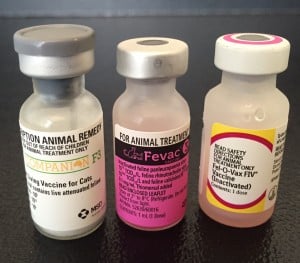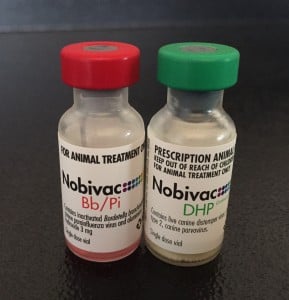There has been a lot of debate in the public sphere over the last few years about vaccines and whether they are necessary or not. My simple answer is: ABSOLUTELY YES!
I have worked with pets from all sorts of backgrounds – pure-bred champion show-stock to ‘pavement specials’. I have also had clients who have been very wealthy and others that have needed assistance from charity organisations to care for their pets. Neither breeding, nor money (meaning fancy food, fancy pet accessories) has been enough to protect an animal from contracting a serious infectious disease that it should have been vaccinated against.
Working in South Africa exposed me to the very real and frequent experiences of Parvo outbreaks, Distemper outbreaks and Canine Infectious Hepatitis. These are devastating diseases that even with ‘no-expense spared’ medical care, leave very few survivors in their wake. Similarly, Herpes, Calici and Panleukopaenia are horrible diseases in cats.
So which diseases do we vaccinate against? How bad can these diseases really be?
Dogs:
Parvovirus:
This is a highly contagious virus that causes widespread damage to the gastrointestinal tract and cardiovascular system. The most common clinical signs are severe vomiting and bloody diarrhoea, inappetence, lethargy, dehydration and death. Puppies can deteriorate very quickly and even with excellent care and all of the supportive treatment money can buy, they very often succumb. The virus is very hardy and can hang around in the environment for 6-12months!
Distemper:
This is another awful disease. It affects pretty much all the organ systems, often starting with a runny nose and cough, progressing to muscle tremors, spasms, seizures, vomiting and diarrhoea and death. A minute number of patients survive this disease, and if by a miracle they do, they have ongoing problems that require life-long medications and management.
Canine Infectious Hepatitis:
This virus causes damage to the liver and kidneys. These are the “waste-management” organs of the body, metabolising wastes and toxins to keep the rest of the body healthy. If they do not function correctly, nothing else dose! Clinical signs include: lethargy, depression, vomiting, diarrhoea, abdominal pain, cloudy eyes and death.
Canine Cough:
Also known as “Kennel Cough”. This is caused by a virus and a bacteria. Canine Cough is highly contagious and is spread on air currents from a cough from an infected dog. It causes a dry hacking cough that may last for 3 weeks. If the animal becomes infected with the bacteria, it turns from a cough into pneumonia and becomes life-threatening. The reason why we vaccinate against these two is because they are so highly contagious, the disease spreads extremely easily and does not need direct contact between an infected and a susceptible animal. It literally spreads with the wind!
Cats:
Herpes:
This virus causes ‘cat flu’: runny eyes, runny nose, sneezing, conjunctivitis, poor appetite, dehydration and death. Cats often remain infected for life, suffering recurrent bouts at times of stress, often with complicated corneal ulcers taking many months to heal. It can be transmitted to kittens very easily.
Panleukopaenia:
This is caused by a virus that results in vomiting, profuse bloody diarrhoea, dramatically low white blood cells, dehydration and death. It will kill most young kittens despite treatment and adult cats that contract it have a long road to recovery if treated in time. It’s a hardy virus and can survive in the environment for a long time.
Calicivirus:
This virus causes ‘cat flu’ symptoms too: runny eyes, nose, sneezing, as well as mouth ulcers, arthritis of many joints and kidney disease. It makes the cat susceptible to secondary bacterial infections and often results in pneumonia. This infection can also be life-long and waxes and wanes when the animal experiences stress.
Feline Immunodeficiency Virus (FiV):
This is the Feline Aids virus which, similarly to HiV, attacks the cat’s immune system, making it susceptible to a whole variety of other infections. FiV is transmitted in the saliva through an infected cat biting a non-infected cat. This vaccine is not a ‘core’ vaccine, i.e. it is not necessary for ALL cats. However, I do recommend it for those spending any time outdoors, since there is always the possibility your pet could get into a spat with another cat somewhere in your garden or elsewhere in the neighbourhood.
So what are the vaccine schedules for dogs and cats:
Dogs:
Dogs need 3 puppy vaccines: one at 6-8weeks, a second at 10-12 weeks and a third at 16-18 weeks, and thereafter annually.
Cats:
Similarly, kittens need three vaccines: one at 6-8weeks, one at 10-12 weeks and a third at 16-18weeks, and thereafter annually. If FiV vaccination is recommended, the initial course involves 3 vaccines given at 2 weekly intervals, followed by an annual booster with the other vaccines.
What is the overall effect of vaccination?
Having as many pets vaccinated as possible means that there is very little chance of a serious outbreak of any of those diseases occurring. No vaccines are absolutely 100% effective. However, if a vaccinated animal is exposed to one of these diseases, it’s chances of surviving is dramatically improved and the spread of the disease is dramatically reduced. Having a high proportion of the population vaccinated also protects the small number of animals that cannot be vaccinated i.e. younger puppies or kittens or those that cannot be vaccinated for medical reasons.
Take it from someone that has nursed and cared for some very ill animals and watched them die horrible deaths, vaccination is definitely worth it!
If you need any further information or would like to book your pet in for a check and vaccination please call 0481 527 678. We’ll help get them on the right track!


